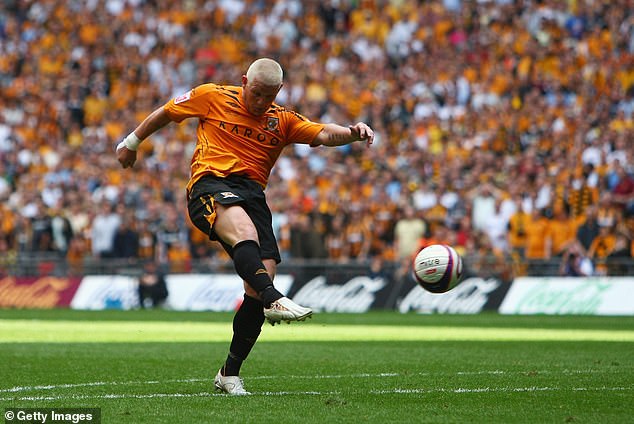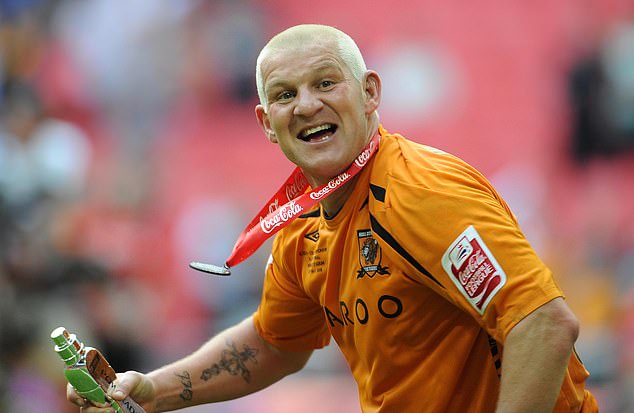Former Premier League star and Hull City legend Dean Windass, 55, is diagnosed with dementia
Former professional footballer Dean Windass has been diagnosed with stage two dementia, a condition that causes mild cognitive decline and memory loss.
The news was first shared by former Manchester United defender David May on BBC Breakfast, where he spoke openly about the growing concerns around dementia in football.
May later clarified on X (formerly Twitter) that Windass had personally given him permission to discuss the diagnosis publicly in the hope of raising awareness of the condition.
Speaking about dementia on live TV, May said: ‘I spoke alone to Dean Windass, ex-professional footballer, yesterday. I asked Deano how he is doing. He has been diagnosed with stage 2 dementia. He’s the same age as me and he’s worried about what things will be like for him in the future.’
Shortly after the news broke, Windass himself posted a video on social media of himself singing in his car, accompanied by the caption: “I just have to keep smiling and try to help people.”
Stage two dementia is characterized by subtle but noticeable memory disturbances, such as forgetting familiar names or phrases and misplacing everyday objects such as glasses or keys. Although these symptoms can often be mistaken for normal aging, they mark the first signs of cognitive decline.
Former professional footballer Dean Windass has been diagnosed with stage two dementia

A prolific striker during his playing days, Windass is best remembered for his remarkable volley in Hull City’s 2008 play-off final against Bristol City

That particular goal secured the club’s historic promotion to the Premier League

A prolific striker during his playing days, Windass is best remembered for his remarkable volley in Hull City’s 2008 play-off final against Bristol City, a goal that secured the club’s historic promotion to the Premier League.
During a career spanning more than two decades, Windass also played for Aberdeen, Bradford City and Middlesbrough, scoring more than 200 goals in more than 600 appearances.
In light of his diagnosis, Windass has joined a growing number of former footballers calling for greater awareness and support regarding the link between professional football and neurodegenerative diseases.
Research has suggested that repeated head impacts during football careers may increase the risk of developing conditions such as dementia, adding urgency to ongoing efforts to better understand and tackle this critical problem.
Fans quickly took to social media to support Windass, with one writing: ‘I’m so sorry to hear that, Deano. My mother had Alzheimer’s disease and vascular dementia. Keep doing what you’re doing mate, stay physically and mentally active my friend and of course you’ve got the Yorkshire grit, fighting spirit and great support.’
Another added: ‘Terrible news and at such a young age thoughts with all his family and friends at this sad time.’ While one supporter wrote: ‘Another footballer with dementia. Very sad news.’
May also discussed the cost of caring for dementia patients on BBC Breakfast. He said: ‘Care costs a lot of money and with the money going to the PFA, is it enough money to care for future generations, one in three of whom are at risk of developing dementia?’
May continued: “Over my career I’ve probably been in charge of football a total of about 20,000 times. It’s only now coming to light. I’d like to know where I’ll be in ten years’ time, whether I the concern of the governing bodies, PFA, for funding that these families are currently not receiving. It is of course worrying.
May is not the only one reporting health care costs. John Stiles that his father, the legendary Nobby Stiles, was forced to auction off his medals to fund the resources he needed, according to The Manchester Evening News.
Several other footballers have spoken out about their concerns. Ex-Manchester United centre-back Gary Pallister has revealed he is concerned about the potential damage to his health, along with his former Three Lions defender Steve Howey.
Pallister, 59, described suffering from ‘sickening’ migraines during his playing career. And Howey, whose clubs include Newcastle United and Manchester City, told how scans show his brain has undergone cognitive decline.
Howey, 53, is now one of a group of claimants taking legal action against the sport’s governing bodies over brain injuries they allegedly suffered during their playing days.
Researchers from a Football Association-backed study into the impact of head injuries on former footballers reported their initial findings in March last year.
The Health and Aging Data in the Game of Football (HEADING) assessed the association between exposure to heading a football, other head effects and concussions with cognitive function among 199 ex-male professionals in England aged over 50 years.
In their first reported findings, the researchers said: ‘Overall, this study does not support an association between football exposure and poorer cognitive function among former male professional players.
‘There was an association between the number of concussions suffered and poorer cognitive function, although the effect size is relatively small.’
Yet neurological scientists have also offered differing opinions, while campaigners on behalf of former footballers who have suffered from dementia are calling for more action.
